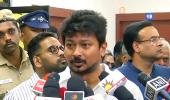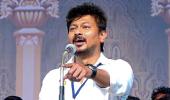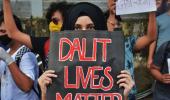Any narrative against the Dravidian model may impact the BJP's prospects in Tamil Nadu.
This may explain why the BJP in Tamil Nadu is placing more emphasis on corruption allegations against the DMK, even as the party focuses nationally on the Sanatana controversy.

Last fortnight, amid controversy surrounding Tamil Nadu's Youth Welfare and Sports Development Minister and Dravida Munnetra Kazhagam leader Udhayanidhi Stalin due to his remarks on Sanatana Dharma, which kicked up a political storm, the DMK camp remained surprisingly composed.
The Bharatiya Janata Party accused Udhayanidhi of calling for the 'genocide' of Hindus, prompting Prime Minister Narendra D Modi to weigh in, demanding a 'proper response' to his remarks.
Interestingly, Chief Minister Muthuvel Karunanidhi Stalin, Udhayanidhi's father, swiftly countered these accusations, dismissing them as a 'false narrative'.
In a statement, Stalin clarified, 'Udhayanidhi expressed his views on the Sanatan principles that discriminate against scheduled castes, tribals, and women, with no intention to offend any religion or religious beliefs.'
'Pro-BJP forces are unable to tolerate his stance against oppressive principles and have spread a false narrative, alleging that Udhayanidhi called for the genocide of people with Sanatan thoughts,' Stalin, who is also the DMK president, added.
Reportedly, Udhayanidhi stated that as the political heir of Conjeevaram Natarajan Annadurai (popularly known as Anna or Arignar Anna), he was not the enemy of any religion and said 'Sanatana is like malaria and dengue and, therefore, it must be eradicated rather than opposed.'
The question arises amid national attention: Why is the DMK camp so composed over this controversy?
According to political experts, this narrative aligns with the DMK's emphasis on inclusive Dravidian models of development and social justice rhetoric. So, what is the Dravidian model?
The Dravidian model of development combines economic development with social uplift.
"When you examine both the economic and social indicators, you'll find that they are strong in the state. When you focus solely on economic development, you get models like those in Gujarat and Maharashtra, and when you concentrate only on social development, it's akin to Kerala. Tamil Nadu's Dravidian model emerges when you prioritise both," explains J Jeyaranjan, vice-chairperson. State Development Policy Council.
This model has united people from diverse castes and religions in the pursuit of social justice.
For instance, the state's graduate enrolment ratio stands at 52 per cent, surpassing even developed countries like the US (38 per cent) and the national average of 27 per cent.

Tamil Nadu also reserves 69 per cent of seats in educational institutions for scheduled castes, scheduled tribes, other backward classes, and students from rural backgrounds.
This inclusive approach is reflected in the state's higher per capita income, at Rs 166,000 in 2022-2023, compared to the national average of Rs 98,374, at constant prices.
Additionally, the Dravidian model promotes gender inclusivity, with the state boasting a 32 per cent female participation rate in the labour force, significantly higher than the national figure of 19.2 per cent (International Labor Organization).
The gross enrolment ratio for women entering colleges in the state is 49 per cent, in contrast to 25 per cent for the rest of India.
Jeyaranjan highlights key measures introduced by the current DMK government, such as free breakfast for school children, free bus travel for women, a monthly aid of Rs 1,000 for women from 10 million families, and a Rs 1,000 grant for girl children pursuing higher education (benefiting 220,000 beneficiaries).
These initiatives exemplify the Dravidian model of economic development.
This may explain why Udhayanidhi chose not to backtrack or apologise but instead compared the inflexibility of Sanatana Dharma with the inclusive nature of Dravidian ideology.
He pointed out that it was the DMK that enacted a law allowing individuals of all castes to become temple priests, and the current government has begun appointing trained archakas as priests at temples.
'This is the Dravidian model,' Udhayanidhi emphasised.
Senior political analyst Sumanth Raman stated that credit for the evolution of the Dravidian model of development should be attributed not only to one party but both the DMK and the All India Anna DMK.
He also acknowledged Kumaraswami Kamaraj's significant role through the introduction of the midday meal scheme in 1957, which took several decades, until 2002, to become a national scheme in all states, following Supreme Court intervention.
A government official noted that, as the second largest economy, Tamil Nadu can afford these social sector schemes.
In the industrial sector, the state demonstrates inclusivity, boasting the highest number of OBC entrepreneurs and one in four Dalit entrepreneurs in India.
The Stalin government has also announced special grants worth Rs 50 crore (Rs 500 million) for startups exclusively owned by scheduled castes and scheduled tribes entrepreneurs.
This level playing field could provide the Dravidian model with an advantage.
Udhayanidhi was not the first to speak out against Sanatana ideology.
Bhimrao Ramji Ambedkar found similarities between the stand of Sanatana ideology against the Untouchables and the anti-Semitism of the Nazis against the Jews.
For Ambedkar, Sanatana-ism was the 'ancient name for militant orthodox Hinduism.'
In 1943, he wrote: 'The anti-Semitism of the Nazis against the Jews is in no way different in ideology and in effect from the sanatana-ism of the Hindus against the Untouchables.'
Political analysts suggest that any narrative against the Dravidian model may impact the BJP's prospects in Tamil Nadu.
This might explain why the BJP in Tamil Nadu is placing more emphasis on corruption allegations against the DMK, even as the party focuses nationally on the Sanatana controversy.
Feature Presentation: Aslam Hunani/Rediff.com











